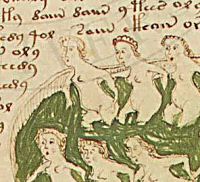
The Column of Lasting Insignificance: April 2, 2011
John Wilcock
 |
 |
 |
WELL, THERE’S THIS manuscript which, according to radiocarbon dating, was written around 600 years ago, but so far nobody’s been able to read it. Would-be translators have checked it against most of the world’s 2,000 written languages but without finding a match. Now the thinking is shifting to maybe the whole thing’s a hoax; a 500-year-old joke. Imagine that!
 The document first emerged in modern times with its discovery in an Italian Jesuit college in 1912, by bookseller Wilfred Voynich by whose name it’s now known, Most of its 246 vellum pages (a few are missing) are illustrated. but these sketches, too, present a mystery, specifically the flowers, most of which don’t resemble any known plants. Some of the pictures include Zodiac signs accompanied by partly naked women; other naked women in pools are shown in the biological section. Other sections could be categorized as herbal and astronomical.
The document first emerged in modern times with its discovery in an Italian Jesuit college in 1912, by bookseller Wilfred Voynich by whose name it’s now known, Most of its 246 vellum pages (a few are missing) are illustrated. but these sketches, too, present a mystery, specifically the flowers, most of which don’t resemble any known plants. Some of the pictures include Zodiac signs accompanied by partly naked women; other naked women in pools are shown in the biological section. Other sections could be categorized as herbal and astronomical.
“One may possibly say that it is a textbook for magicians, physicians, pharmacists, and astrologers,” says Klaus Schmeh in the current Skeptical Inquirer. “When it comes to these professions, their borders were still blurred 500 years ago.”
Schmeh, a German computer scientist who specializes in cryptography, writes that it is surprising how little the “ambiguous” illustrations reveal, suggesting that they may have been deliberately inserted “to prevent inferences about the encrypted (and therefore secret) text….It is unclear whether it is an encrypted message or simply a text composed of unknown letters. My favorite explanation is that it was simply created to produce a mystery.”
The language of the Voynich manuscript corresponds more to European ones, researchers agree, because the average word length is four or five letters. It differs, on the other hand, in that among the 35,000 words (there is no obvious punctuation) are none with two letters or more than ten.
Authorship has been credited to some of history’s big names, among them the Franciscan friar and philosopher Roger Bacon and the 16th-century occultist Sir Edward Kelley. The ms. was owned at one time by Kelley’s friend, the British magician Sir John Dee (1527-1608), who is believed to have sold it to Rudolph II, the 17th century King of Bohemia. It passed to other owners and is now in a library at Yale University.
According to tests conducted by the University of Arizona, the vellum pages of the manuscript date to 1404-1438, Ink is harder to date and could have come from later in that century. At any rate, it was written with a quill pen and predates even the Gutenberg Bible by 25 years.
Is the mysterious manuscript a work about alchemy? A Chinese agricultural calendar? Greek shorthand? A secret suicide ritual from the 12th century Cathar sect in France? Could it be a written form of glossolalia, the religious “speaking in tongues”? All these and more have been suggested explanations.
Current theories now revolve around Gordon Rugg, 54, a Scottish-born lecturer and researcher in Linguistics at Keele University who emailed me:
“I think that the manuscript is much more likely to be a meaningless hoax than to be either an unidentified language or an un-cracked code, or anything else (e.g. an unknown language which has also been encoded — there are some pretty exotic theories out there).”
The recent National Geographic documentary had pointed out, he said, that there were no erasures in the manuscript.
(The neat way of correcting mistakes on vellum or parchment was to scrape the ink off, then write the correct word; the scruffy way was to draw a line through the mistake, and write the correct word either above it or after it; neither of those occurs in the manuscript.)
“Anyway, what it means is that in a manuscript over 200 pages long, there aren’t any corrections. Someone wrote 200 pages without a single mistake or didn’t care about making mistakes which would make a lot of sense if the author knew that they were producing meaningless gibberish, as part of a hoax.”

The research methods Rugg used are, frankly, a bit too complicated for non-academic minds like mine to understand or explain, involving the use of what’s known as a Cardan grille — basically just a piece of card with some holes cut in it, like a stencil — “not exactly high tech,” he says, “but it’s actually very wearing mentally to pick out combinations of syllables for hours on end.”
The Skeptical Inquirer says that the University of Arizona is expected to issue another report about the manuscript later this year.
Congressional Reform Act of 2011
-
- TERM LIMITS.
12 years only, one of the possible options below.
- TERM LIMITS.
- Two six-year Senate terms
- Six two-year House terms
- One six-year Senate term and three Two-Year House terms
- NO TENURE / NO PENSION.
A Congressman collects a salary while in office and receives
no pay when out of office.
-
- CONGRESS (PAST, PRESENT & FUTURE) PARTICIPATES
IN SOCIAL SECURITY.
- CONGRESS (PAST, PRESENT & FUTURE) PARTICIPATES
All funds in the Congressional retirement fund move to the
Social Security system immediately. All future funds flow
into the Social Security system, and Congress participates
with the American people.
- CONGRESS CAN PURCHASE THEIR OWN RETIREMENT
PLAN, JUST AS ALL AMERICANS DO. - CONGRESS WILL NO LONGER VOTE THEMSELVES A
PAY RAISE. CONGRESSIONAL PAY WILL RISE BY
THE LOWER OF CPI OR 3%. - CONGRESS LOSES THEIR CURRENT HEALTH CARE
SYSTEM AND PARTICIPATES IN THE SAME HEALTH
CARE SYSTEM AS THE AMERICAN PEOPLE. - CONGRESS MUST EQUALLY ABIDE BY ALL LAWS
THEY IMPOSE ON THE AMERICAN PEOPLE. - ALL CONTRACTS WITH PAST AND PRESENT
CONGRESSMEN ARE VOID EFFECTIVE 1/1/11.
Serving in Congress is an honor, not a career. The Founding Fathers envisioned citizen legislators: serve your term(s), then go home and back to work.
[The above emailed by an anonymous contributor
who requests readers to pass it along]
THE TERMINAL DECLINE of newspapers, writes Chris Hedges in Truthout “has destroyed thousands of jobs that once were dedicated to reporting, verifying fact and giving a voice to those who without these news organizations would not be heard. Newspapers, although they were too embedded among the power elite and blunted their effectiveness in the name of a faux objectivity, at least stopped things from getting worse. This last and imperfect bulwark has been removed.
“It has been replaced by Internet creations that mimic journalism. Good reporters, like good copy editors or good photographers, who must be paid and trained for years while they learn the trade, are becoming as rare as blacksmiths. Stories on popular sites are judged not by the traditional standards of journalism but by how many hits they receive, how much Internet traffic they generate, and how much advertising they can attract. News is irrelevant. Facts mean little. Reporting is largely nonexistent. No one seems to have heard of the common good.
“Our television screens are filled with these new chattering celebrity journalists. They pop up one day as government spokespeople and appear the next as hosts on morning news shows. They deal in the currency of emotion, not truth. They speak in empty clichés, not ideas. They hyperventilate, with a spin from the left or the right, over every bit of gossip. And their corporate sponsors make these court jesters millionaires. We are entertained by these clowns as corporate predators ruthlessly strip us of our capacity to sustain a living, kill our ecosystem because of greed, gut civil liberties and turn us into serfs.”
THIS MAY SOUND PETTY, but you know all those little wrapped chunks of soap that you’ve been taking home from hotels you’ve stayed in? Well, homeless street people would be delighted to have them, and one charity, the Lamp Community (526 S. San Pedro Ave, Los Angeles, CA. 90013) is eager to pass them out. Grab a Priority Mail envelope from the post office, fill it up with soap and tiny shampoos, then mail it. Making a few dozen bedraggled people happy for a day or two for a meager $4.90 (postage) is a very inexpensive good deed.
{John Wilcock is out of the country until mid-April}
